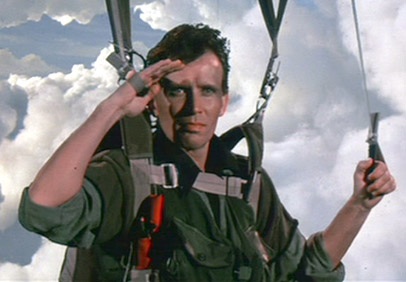Cult classics are rarely born, they are chosen. It is not a knock on the cult classic as an institution to mention that movies that achieve that status usually do so by failing in some regard. Otherwise, they wouldn’t need adjectives. Some movies become cult classics by being bad in a charming and/or entertaining way, some by being transgressive in ways mainstream society isn’t prepared to deal with, others by just being flat-out weird. I submit, with great fondness, that The Adventures of Buckaroo Banzai Across The 8th Dimension, belongs to the latter category.
This isn’t to say that “if only the squares could understand it, Buckaroo Banzai would have been a hit.” Even to the most gracious and open-minded nerd, Buckaroo Banzai requires a great deal of attention to follow, far more than one normally associates with escapist entertainment, even in SF where a slight bit more is required if the movie in question is actually good SF. What would customarily be first-act exposition in Buckaroo Banzai, namely the details of the hero’s parentage and his early, formative development into the esoterically erudite Renaissance man he becomes, is relayed in a pre-credit crawl, in the fashion made popular by Star Wars. The audience is then tossed right into the deep end of the action, and either sinks or swims. Judging by its failure at the box office (grossing a mere $6 million on a budget of $12 million), it would appear all too many in Buckaroo Banzai‘s initial audience sank (among those confused by the movie, definitely count Fox executives, who had no idea how to market it, and thus basically didn’t).
Personally, I loved this movie the first time I saw it (which was, oddly, only about five years ago), and I’ve loved it each time I’ve seen it since. It pains me that Buckaroo Banzai is paradoxically decades ahead of its time and yet completely of its time; it’s profoundly a movie by, for, and of geeks and nerds at a time before geek/nerd culture was mainstreamed, and a movie whose pre-CG special effects and pre-Computer Age production design were an essential part of its good-natured enthusiasm. What at the time was a hip, modern take on classic SF is now, almost thirty years later, almost indistinguishable from the SF cinema that inspired it in terms of the appeal to modern viewers: the charmingly old-fashioned special effects, and the comparatively innocent earnestness of its tone.
The story defies most attempts at description. It stars neurosurgeon/theoretical & practical physicist/race car driver/rock & roll star/comic book hero Buckaroo Banzai (Peter Weller), who along with his loyal comrades The Hong Kong Cavaliers (who serve with equal effectiveness as, variously, his medical and scientific support staff, backing band, and guys with guns for when bad guys need dealing with) try to save Earth from invasion by aliens from the 8th Dimension called Red Lectroids—it was the 80s, so a passing nod to the Commies was necessary—and from destruction by aliens from Planet 10 called Black Lectroids, who while reasonably friendly, can nonetheless not permit the Red Lectroids to run amok any longer. Oh, and the initial Red Lectroid invasion was reported by Orson Welles on the radio only to have him claim it was a radio adaptation of War of the Worlds. Oh, and all the Lectroids, Red and Black, are named John.
While that is a reasonable summary of the central conflict of the movie, it doesn’t even begin to cover it. The problem is, alternate explanations like “This movie is about Buckaroo Banzai being awesome” and “Dude, his homies are called The Hong Kong Cavaliers, how is that not cool?” “It just rules, what else can I say?” also lack sufficient scope. But they speak to to the exuberance of the movie, its proudly bizarre and intricately detailed back story, and its firm belief in the fact that certain things are just cool.
Director W.D. Richter does a fairly decent though unspectacular job bringing Earl Mac Rauch’s utterly (and wonderfully) insane script to life, as its the cast that really makes Buckaroo Banzai the delight it is. Weller does a fine job in the title role, making the effective choice of playing the character totally straight, thus making him seem all the more eccentric. John Lithgow, as the half-human/half-Red Lectroid boss Emilio Lazardo/John Whorfin, takes the opposite tack, overplaying and chewing as much scenery as he can get his hilarious fake teeth on. The Hong Kong Cavaliers, mainly Clancy Brown as Rawhide, Pepe Serna as Reno Nevada, and Lewis Smith as Perfect Tommy, all have a swagger that’s rooted firmly in Westerns, and a very natural chemistry with each other and with Mr. (Dr.?) Banzai. It’s also a chance to see a very young Ellen Barkin and Jeff Goldblum being amusing in underwritten roles, though the funniest performances in the whole movie might be the trio of Christopher Lloyd, Vincent Schiavelli, and Dan Hedaya as squabbling Red Lectroid underlings. (Lloyd in particular has a running gag that appeals to the eight-year-old in us all, wherein people persist in mispronouncing his last name “big booty” when it’s really “big boo-TAY.”)
The Adventures of Buckaroo Banzai Across the 8th Dimension is a movie one either is able to “just go with” or ultimately finds bewildering. The thing is, even with the full force of Fox’s promotional might behind it, it’s still a strange enough movie that it might have been consigned to cult classic status anyway, though the chances of the announced sequel in the closing credits being made would go up considerably. But such what-ifs, unanswerable as they are, are beside the point, which is: Buckaroo Banzai is a profoundly geeky good time at the movies. And, after just one viewing, watching it again is like hanging out with old friends, and fun ones at that.
Danny Bowes is a playwright, filmmaker and blogger. He is also a contributor to nytheatre.com and Premiere.com.










